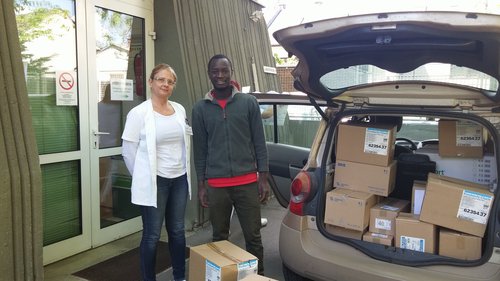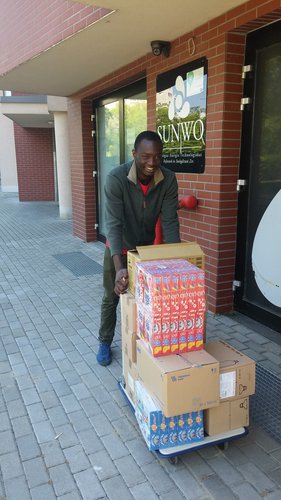Helping Despite Uncertainty
2015. december 10., csütörtökDauda Condé arrived in Hungary in 2009, at the age of sixteen, after fleeing violence in his home country of Guinea. He has been living here ever since – even after those he made the journey with left for new homes. Recently he has learned that he will not be able to gain refugee status here, but still he stays in hopes of gaining residency in this place that now feels like his home. If he cannot get permanent residency, he hopes to stay as long as possible to he can receive an education to take back with him in order to help his home country.
Dauda Condé has been in Hungary for six years; in the beginning he was seeking asylum from his home nation of Guinea and he thought that, despite taking years, the process was still moving forward and that he’d eventually be recognized. He spent years studying the Hungarian language and learning about the new culture that he was a part of, but, despite all this, he learned this year that he will not be able to gain asylum and stay permanently in Hungary. Now he must apply for a residence permit instead and hope that the Hungarian government allows him to stay long enough to continue both his studies and the life that he has built for himself here.
“I live with all of this uncertainty constantly. I do the best that I can but it’s so hard to concentrate when these worries always peek through,” Dauda says about the recent realization that he will not be allowed to stay in Hungary, despite all of the work he has done to make this country his home.
Dauda is a model citizen – he’s been here for six years and has never been in fights and he has a good record with the police. He has gone out of his way to learn about the culture of Hungary and do his best to fit in. Not only does he study very hard, but he speaks excellent Hungarian, one of the hardest languages to learn. “I do the best I can,” he says modestly.
Despite all of this work to build a life here in Hungary, he feels frustrated sometimes. “What else can I do to prove my worth here – how can it still be such a fight for me to get a residence permit to stay? What else can I do?” he asks says throughout our conversation.
It’s hard for him to fully settle into life here in Hungary, even after all these years, due to the constant insecurity that he faces – he never knows how much longer the Hungarian government will allow him to stay.
“I have a life here and I’m healthy. I just wish for that piece of paper that would let me stay,” Condé says earnestly.
Dóra Kanizsai-Nagy, head of the RCH Refugee Ministry, says that when someone has refugee status in Hungary, they are not allowed to have contact with their home nations. The government’s position is that if they left due to persecution or instability then they shouldn’t keep in touch because it may still be too dangerous for them. Since his application for refugee status was denied recently, Dauda realized that he may be sent back to Guinea in the near future, and he wanted to do all he could to begin building bridges with those back in his home nation. He was proactive and got in touch with the Honorary Consul of Guinea in Hungary, Mr. Joseph Steier, to see what would be the best course of action for him to take. This happened just as the Ebola outbreak was occurring.
Due to this crisis that was occuring, Dauda decided to reach out to his contacts here with the Reformed Church in Hungary, who had been aiding him in his effort to gain refugee status, in order to help citizens in Guinea. He worked with the church, and the Consul, an expert in the field of Ebola studies, to send vital medical supplies back to a hospital in Conakry, the capital city of Guinea.

With the head pharmacist at Bethesda Hospital of RCH
“It’s not just Guinea that struggles with medical issues such as Ebola. Throughout the continent of Africa there are many nations that struggle with poverty and, due to a combination of factors, cannot get access to good medical care. The diseases that affect many of these countries are curable, but due to poverty and the governments in power, the people still suffer,” Dauda says. It was this knowledge, and his unique contacts here in Hungary, which helped him to make the necessary connections to send medical supplies back to his home nation, where most of his family still lives.
After this close working relationship, Dauda and the consul are still quite close as Dauda prepares every day for the news that he will be sent back to Guinea. He hopes to stay in Hungary as long as possible, but he understands that he may only be able to stay just long enough to finish his studies so that when he returns to his home nation, he has more knowledge to share and impart upon the people there. The Consul has spoken to Dauda about the similarities between the two nations, and says that both Guinea and Hungary are water collectors. He hopes that Dauda can learn about how Hungary manages its water resources in an environmentally friendly manner so that he can then take these skills back to Guinea upon his return. The Consul has also been recommending courses of study that Dauda should take during his time in Hungary, studying topics that will be of great help upon his eventual return to Guinea. In this way, his experiences and education here in Hungary can be translated into a new context to help benefit the Guinean people – a true example of cross-cultural learning.

At the Honorary Consular Mission of the Republic of Guinea, Budapest
Now that Dauda is in his final push to gain residency in Hungary, and be able to stay long enough to finish his studies, Dauda finds inspiration in all of the support he has from people at the church, and the Honorary Consul himself. People have been writing letter after letter of support for him to take to the Office of Immigration for his hearing. “I feel confident that this pile of papers that I have now, all of these letters and forms, will bring about a good decision for me. The government will really have to decide now whether I can stay because I have so much support behind me,” he says hopefully.
“After I was denied this last time, the officer looked me straight in the eye and told me, ‘We don’t want to send you back, we don’t want to deport you,’” Dauda says. The bureaucratic structure here is complicated, but he feels confident that if the government of Hungary wanted to be strict and send him back, they would have already done so. He hopes that they see what a wonderful and productive citizen he is being, even if he doesn’t have status.
Thanks to his unique position here in Hungary, Dauda is poised to be a great bridge between his current home and his native land of Guinea. The Refugee Ministry of the Reformed Church in Hungary supports Dauda in his quest for education and is thrilled to see what his future will bring. “With the education he gets here, he could really change the world in Guinea,” says Dóra Kanizsai-Nagy, head of the RCH Refugee Ministry.
Written by Kearstin Bailey
Contact us
Click here if you are interested in twinning.
Reformed Church in Hungary
Address: H-1146 Budapest, Abonyi utca 21.
PO Box: 1140 Budapest 70, Pf. 5
Email: oikumene@reformatus.hu
English, German and Korean language services in Budapest
Links
Recommended articles
-
Pastoral Letter in the Light of the Pandemic
Bishop Dr. István Szabó sent a pastoral letter of encouragement to the ministers serving in RCH’s congregations, expressing his gratitude for the persistence and creativity of the pastors.
-
RCH Joins in Pope's Call for Prayer
RCH published the call on congregations to join the initiative of Pope Francis, supported by ecumenical organisations, to unite in praying the Lord’s Prayer on Wednesday, 25 March, at noon.
-
English Speaking Worship Services Online
Each Sunday at 11 AM (CET) the St. Columba's Church of Scotland in Budapest, the international community of RCH invites you to join the worpship service on its facebook page.
-
Test of Humanity and Companionship
Reformatus.hu asked Dr. György Velkey, Director General of the Bethesda Children’s Hospital of RCH about the challenges of health care workers and ways of prevention against the pandemic.
-
All Church Events Suspended
In light of the coronavirus the Presidium of RCH requested congregations to suspend all church events with immediate effect. Beside restrictions, it calls for prayer, sobriety and responsibility.











